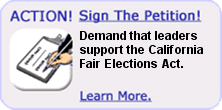
'Clean Money' Hits Council's Nerve
![]() Campaign system could cost city $9 million a year, require tax
Campaign system could cost city $9 million a year, require tax
Reforming citywide election campaigns to a publicly funded
"clean money" system could cost Los Angeles around $9
million a year and would likely require a special tax on
residents, city leaders acknowledged Wednesday.
As the City Council held its first major public debate on
the issue that it hopes will restore trust in City Hall,
members bristled at the implication that their campaigns
are "unclean" because they solicit private donations.
"I get upset when you talk about clean money. That means
you're dirty because you've been a part of this ...," said
Councilman Tom LaBonge. "You do have to go out and get
supporters, and supporters have to make donations, and you
report those donations, but you always have to serve the
people in the best of their interests."
The council quickly moved to rename the concept "full
public financing" but the suggestion that taxpayer dollars
be used for the effort also drew sharp criticism from some
members.
"We're going to say to voters, `We're going to tax some of
you so someone can run for office?"' asked West Valley
Councilman Dennis Zine. "The San Fernando Valley would go
ballistic."
Proponents, however, said voters are so tired of the
current system they might be willing to pay up - perhaps
with a tax or by adding a surcharge on certain fines.
"Give the voters a choice. People should not be afraid to
have the debate. The public is so cynical about elections
and a lot of people are discouraged from running right
now," Councilwoman Wendy Greuel said. Greuel, along with
council President Eric Garcetti and Councilman Bill
Rosendahl, has led the effort for publicly financed
campaigns.
After holding several town-hall meetings across the city
this year, the council members said they believe there is a
strong demand for a clean campaign system.
The city's efforts are among clean-money campaigns gaining
momentum across the nation as officials seek to restore
public trust in politicians and reduce the influence of
special-interest donors and lobbyists, such as Jack
Abramoff who admitted corrupting federal government
officials.
In Los Angeles, former City Councilman Martin Ludlow has
pleaded guilty to felony charges of violating
campaign-finance laws. And former Mayor James Hahn's
administration had been under criminal investigation for
allegations that companies were pressured to make campaign
contributions to get city business.
University of Southern California law professor Elizabeth
Garrett said voters in other states, including Arizona and
Maine, have been willing to spend public dollars to fund
campaigns.
But it's unclear whether Angelenos will want to make that
commitment.
"A lot depends on how much they are frustrated with the
current system and how much they believe the current system
is broken," Garrett said. "At a certain point voters get
fed up and want to try something new."
Jon Coupal, with the watchdog group Howard Jarvis Taxpayers
Association, believes voters already feel overtaxed.
He notes voters recently rejected proposals to raise taxes
to fund universal preschool and for a library bond
measure.
"Those are far more sympathetic causes than establishing a
system where public money is handed over to politicians for
their campaigns," he said.
He suspects that residents would more quickly support full
and immediate disclosure of all campaign contributions, and
heavy penalties for violators - all which wouldn't cost
taxpayers.
Los Angeles has offered some limited public financing for
candidates since 1990 and about 70 percent of those elected
to office have taken advantage of the program.
The city now budgets about $2.6 million each year for
funding assistance.
The current proposal is still being developed, but it would
provide candidates all the money needed to run their
campaigns. In exchange, candidates would raise a small
amount of seed money to qualify, then limit their
spending.
The program would be voluntary, raising concern among some
council members that a rich candidate could still outspend
the public financing system.
Plus, the program wouldn't address large independent
expenditures, made on behalf of a candidate, that often
skirt campaign-finance rules.
Chief Legislative Analyst Gerry Miller said full public
financing of campaigns would cost about $9 million per year
and require a general or special tax.
However, California Clean Money Campaign Executive Director
Susan Lerner said the CLA's estimate was conservative and
didn't fully investigate using surcharges on fines or
tickets to raise money.
The City Council directed the CLA, City Ethics Commission
and city attorney to prepare a detailed proposal for
publicly funded campaigns, including how to pay for
them.
Any change to the city's current campaign-finance system
would require a public vote and a change to the City
Charter.
City officials are hoping to put a clean-money proposal to
voters in March.
A similar measure calling for public financing of state
campaigns has qualified for the November ballot.
See the article on Los Angeles Daily News website
(In accordance with Title 17 U.S.C. Section 107, this material is distributed without profit to those who have expressed a prior interest in receiving the included information for research and educational purposes.)

